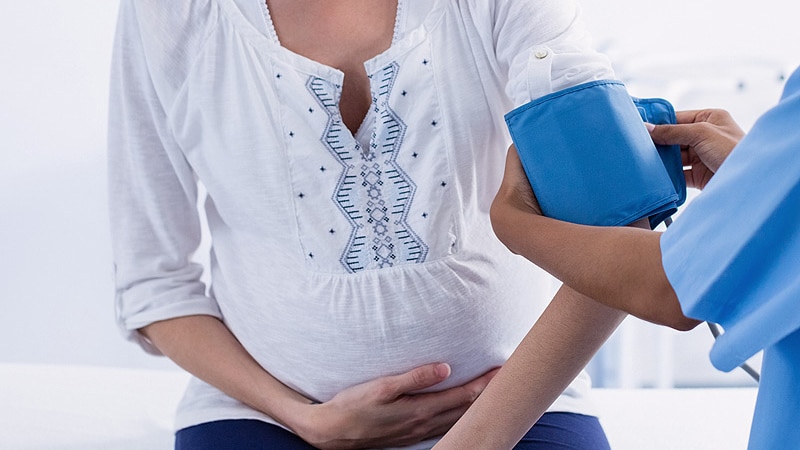Women with a hypertensive disorder of pregnancy (HDP) are at increased risk of developing dementia later in life, new research suggests.
Results from an 80-year retrospective cohort study of more than 56,000 women showed that, after adjusting for relevant co-factors, participants with a history of preeclampsia/eclampsia had a 1.38 times higher risk for all-cause dementia and a 1.58 times higher risk for vascular dementia than their peers with no history of HDP.
Further, women with a history of gestational hypertension had a 1.36 times higher risk for dementia overall and a 2.75 higher risk for vascular dementia vs those without a history of HDP.
“Health systems should ensure that women who experience HDP or other pregnancy complications should receive optimal primary and secondary preventive care for improved health across the lifespan,” co-investigator Karen Schliep, PhD, University of Utah Health, Salt Lake City, told Medscape Medical News.
She reported the findings at the Alzheimer’s Association International Conference (AAIC) 2022.
Long-Term Consequences?
“Research over the last decade has demonstrated that women who develop HDP are at increased risk for long-term cardiovascular and metabolic disorders. Consequently, the American Heart Association and American College of Obstetricians and Gynecologists now include HDP as a risk factor for future cardiovascular disease,” Schliep said.
“Whether HDP is additionally linked with later-life adverse neurologic conditions with similar inflammatory vascular etiologies, specifically Alzheimer’s disease and vascular dementia, has not been fully addressed,” she added.
She noted the current findings are in line with those from a large study from Denmark published recently in the BMJ.
In that study, pregnant women who developed preeclampsia had a greater than threefold higher risk of developing dementia later in life than women who did not have the pregnancy complication.
Findings from the current study are based on 19,989 women with a history of HDP who were matched to 36,679 women without a history of HDP. All of the women gave birth in Utah between 1939 and 2019 at a mean age of about 28 years.
In the HDP group, 3.5% had eclampsia, 62.4% had preeclampsia, 33.5% had gestational hypertension, and less than 0.6% had hemolysis, elevated liver enzymes, low platelet count (HELLP) syndrome.
Results showed elevated risk for dementia overall, vascular dementia, and other dementia in women with a history of preeclampsia/eclampsia and gestational hypertension vs those without an HDP.
| Table. Dementia Risk, adjusted hazard ratios (95% CI) | ||||
|---|---|---|---|---|
| HDP Subtype | Dementia Overall | Vascular Dementia | Alzheimer’s Disease | Other Dementia |
| Preeclampsia/ eclampsia | 1.38 (1.26 – 1.50) | 1.58 (1.11 – 2.24) | 1.04 (0.87 – 1.24) | 1.51 (1.36 – 1.68) |
| Gestational hypertension | 1.36 (1.03 – 1.79) | 2.75 (0.90 – 8.40) | 1.18 (0.52 – 2.68) | 1.31 (0.96 – 1.80) |
Schliep said the current findings are noteworthy because they suggest risk for vascular dementia may be just as high for women with a history of gestational hypertension as for those with a history of preeclampsia.
Looking at the big picture, she noted that “HDP affects 1 in 7 deliveries in the US and there are preventive measures that can mitigate cardiovascular disease and dementia risks for women with a history of HDP and other pregnancy complications.”
These include exercise, weight control, smoking prevention and cessation, and early identification and treatment for elevated lipids, high blood pressure, and diabetes, Schliep said.
Another Puzzle Piece
Commenting on the findings for Medscape Medical News, Heather Snyder, PhD, vice president of medical and scientific relations at the Alzheimer’s Association, said it is becoming clear there are things throughout life that may contribute to risk for Alzheimer’s disease, vascular dementia, and other dementia types.
“Understanding all of the pieces of this puzzle are going to be essential as we think about what may be someone’s lifetime risk of Alzheimer’s and other dementia,” Snyder said.
What makes the study important is the large number of women included and the long follow-up period, she noted.
The results suggest HDP “may contribute to dementia risk, which means we should be thinking about not only the number of pregnancies a woman has but go beyond that and determine what the pregnancy was like and whether a hypertensive disorder was present,” Snyder said.
“Answers to those questions become important in terms of later life brain health,” she added.
The study was funded by the National Institute on Aging, National Center for Research Resources, and National Cancer Institute. Schliep and Snyder have disclosed no relevant financial relationships.
Alzheimer’s Association International Conference (AAIC) 2022: Abstract 62354. Presented August 3, 2022.
For more Medscape Psychiatry news, join us on Facebook and Twitter.
Source: Read Full Article
